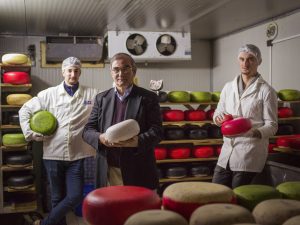Albania (officially the Republic of Albania) is a small mountainous country on the Balkan Peninsula, with a long Adriatic and Ionian coastline. Together with neighboring Kosovo, mainly inhabited by Albanians, it has a Muslim confessional majority, derived from the Ottoman period that lasted for centuries. 17% of the population is Christian, divided between Orthodox and few Catholics.
In 2023, the Albanian National Institute of Statistics published a new census document, according which country's population is 2.4 million, with a significant decline of more than 400,000 compared to the previous census published in 2011.
After World War II, Albania became a Stalinist state under Enver Hoxha and remained firmly isolationist until the transition to democracy after the 90s. The 1992 elections put an end to 47 years of communist dictatorship and in the second part of the decade a rapid turnover of presidents and prime ministers occurred. Many Albanians left the country in search of work; remittances from Albanian diaspora still represents a vital source for national economy.
Thanks to the elections in 1992, a new era started for Albania, transforming its condition as one of the poorest countries in Europe to a medium-high income State. According to the latest Human Development Report, published in 2023 with 2021 data, Albania records a value of 0.796 corresponding to position no. 67 in a list that includes 189 countries [1].
Albania today is a member of the United Nations, NATO, OSCE, Council of Europe, World Trade Organization and one of the founding members of the Union for the Mediterranean.
Accession process – basic timeline [2]
April 2009 – Application for membership to the European Union submitted
June 2014 – Recognition of candidate status
March 2020 – Political agreement reached on the opening of accession negotiations
July 2022 – Accession negotiations officially opened
 The Italian Cooperation has been present and operating in Albania since 1991, supporting development and growth of the country. Given its geographical proximity to Italy and historical, cultural and economic ties between the two countries, Albania has always been one of the main development partners in the Balkans.
The Italian Cooperation has been present and operating in Albania since 1991, supporting development and growth of the country. Given its geographical proximity to Italy and historical, cultural and economic ties between the two countries, Albania has always been one of the main development partners in the Balkans.
Relevant Italian funds supported Albanian government to improve living conditions of population after the end of the regime and along the path towards democracy, opening a Local Technical Unit (UTL) in 1992. Several infrastructures, technical assistance programs and TVET projects were carried out by Italian stakeholders in the following thirty years, until the Framework Agreement for Development Cooperation signed between the Council of Ministers of the Republic of Albania and the Government of the Italian Republic on December 2, 2008.
The Italian Cooperation has subsequently expanded its modalities, including interventions focusing on capacity building, at central and local level, through skills and technical support provided by Italian stakeholders working on the field, aiming at facilitating accession process to the European Union and improving living conditions of population, in particular groups in need of social protection.
[1] Human Development Index | Human Development Reports (undp.org)
